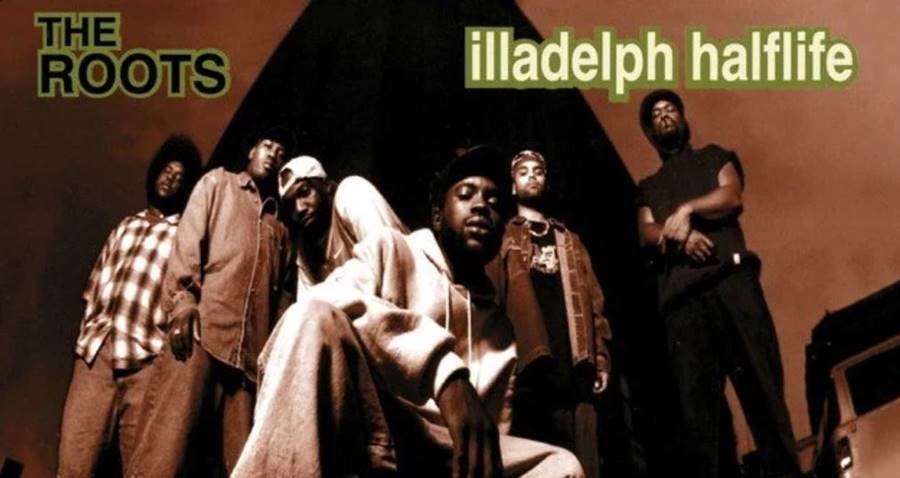
By Jae-Ha Kim
Chicago Sun-Times
August 15, 1997
The Artist Formerly Known as Prince has nothing on the Roots’ Ahmir Khalib-Thompson. Since the band formed 10 years ago, the drummer has billed himself as ?uestlove and B.R.O. the R. ?uestion, before settling on his first name (which not only sounds better than the other monikers, but also is less confusing).
Last year proved to be the most commercially successful for the Philadelphia-based band, thanks to its superb, intelligent album “illadelph halflife.” Rolling Stone readers and critics picked the group as the best rap act of the year. And “illadelph” was selected as one of the top records of 1996 by publications ranging from Spin to the Source.
Currently touring as part of the House of Blues Smokin’ Grooves tour, the Roots will play tonight at the New World Music Theatre in Tinley Park. The hip-hop band also includes rappers Black Thought (a.k.a. Tariq) and Malik B, bassist Hub, keyboardist Kamal and the amazing human percussionist Rahzel the Godfather of Noyze, hose skills rival Bobby McFerrin’s.
Phoning from a hotel room in Los Angeles, Ahmir chatted about his budding career as a journalist and his music.
Q. How did you get your column in Rap Pages?
A. I do all the liner notes for our records. So based on those, the editor there hired me to write for them. When our fourth album comes out in March, I’m going to ask them if I can review it. It’s a definite conflict of interest, but I could be objective about what I say about us. (Laughs)
Q. Do you really think you could be objective about reviewing the Roots?
A. Sure. There are songs I like on this album and songs I don’t like on this album. As a producer, I learned from Quincy Jones that all good albums sometimes have low-lights to offset the highlights.
Q. Why would you release an album with songs you aren’t crazy about?
A. Because there are other band members who like different things. Black Thought and I are the two founding members, but it’s not like a coup situation. Everyone gets their say. There are lots of ideas that get put out there that get rejected. You have to learn that sometimes you’re not always right.
Q. How was touring with Beck?
A. It was a lot of fun. I kept a whole journal because Rap Pages wanted something on how a rap group survived on that tour. I remember when we played with him (at the University of Chicago in April), our plane was delayed and we had 12 minutes to get onstage. I remember all this chaos and disorder. Nobody knew where the backstage was. We just wound up going through the audience and jumping onstage. I remember I told Beck he should sing like crazy, and he wasn’t sure the people in Illinois would get it. That was a strange show.
Q. How’s the Smokin’ Grooves tour working out for you?
A. It’s going OK. We were forced into the first position because Foxy Brown dropped from the tour. I think that four out of five ushers think we’re great, but no one else really is in the venue until our last song. It’s a little frustrating ’cause you want an audience to play for. But I don’t blame the fans. If I got tickets for a show and it said 7:30 on the ticket, you know the person you want to see won’t come on till 9:30. I have to write about Smokin’ Grooves. I still don’t know how to approach giving it a fair review.
Q. The Roots are pegged as an alternative band. How does that ring with you?
A. In a street sense, alternative means no skills. That’s why I hate that term. I don’t know. We’re different, but then again what is hip-hop now? Is it “I’ll Be Missing You” by Puff Daddy (and Faith Evans) or the latest from the Wu-Tang Clan? Anything that’s different is technically alternative, so in that sense we’re definitely alternative.
Q. Artists always say they don’t read their reviews. Do you?
A. It’s a major conflict with me. I say I can’t read any reviews or anything, but you know I’m obsessed with it. I’m always calling up writers going, “Did you like it?” That’s (one reason) why we’re artists – to get attention. I don’t buy that whole Eddie Vedder posturing. This is a business and you have to sell product. But it’s important to leave your mark. I would love to leave a legacy like Lennon and McCartney, Brian Wilson, Joni Mitchell. . . . That’s what you aspire to do.